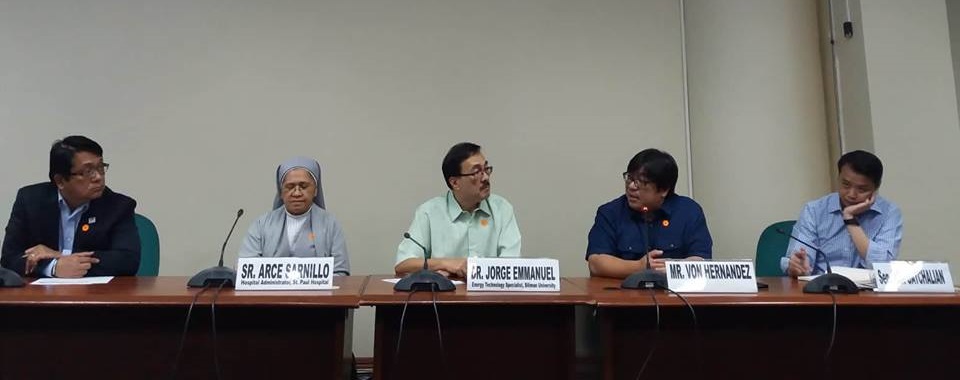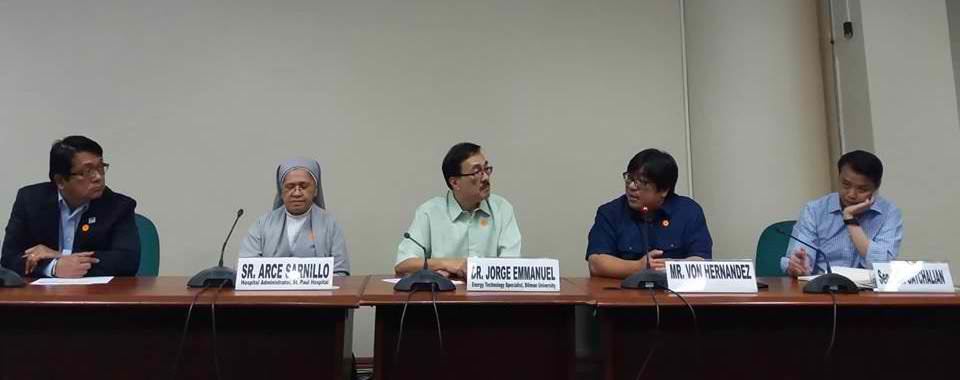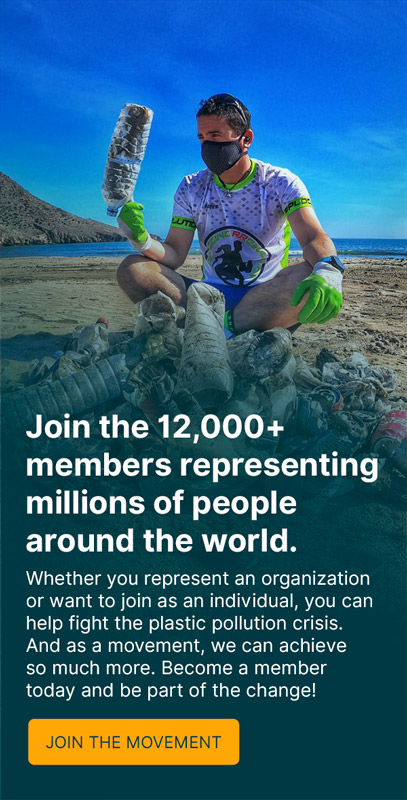 “Thermal waste-to-energy facilities will not solve our waste problems but rather make things worse. Despite claims to the contrary, these facilities release toxic chemicals—including dioxins and furans—which are very harmful both to human health and the environment, said Dr. Emmanuel.
“Thermal waste-to-energy facilities will not solve our waste problems but rather make things worse. Despite claims to the contrary, these facilities release toxic chemicals—including dioxins and furans—which are very harmful both to human health and the environment, said Dr. Emmanuel.
In a forum organized by the Senate Committee on Environment and Natural Resources, Dr. Emmanuel explained that dioxins are toxic at extremely low concentrations and stay in the environment for a long time. “Dioxins released today by an incinerator or WtE will affect not only you and your children, but many generations hence,” he emphasized.
“Dioxins are among the most toxic chemicals known to science. They can cause several types of cancer, reproductive disorders, and developmental problems,” he warned.
One of his concerns is that operators of these technologies only test their dioxin emissions once or twice a year yet the results of continuous monitoring of dioxins show that quarterly or even monthly tests may miss episodes of very high releases since dioxins are not emitted uniformly. Furthermore, thermal waste-to-energy projects compel communities to produce more waste rather than reduce waste.
Several lawmakers from both the House of Representatives and the Senate have proposed changes to the Clean Air Act of 1999 (RA 8749) in a bid to lift the ban on waste incineration. A bill in the House of Representatives has already passed the third reading this year while a counterpart legislation is being proposed in the Senate.
Green groups belonging to No Burn Pilipinas echoed the same concerns on the planned repeal of the incineration ban. Aileen Lucero, National Coordinator of Ecowaste Coalition Philippines, said the Congress should rather focus on strengthening the Ecological Solid Waste Management (RA 9003) by passing measures aimed at waste prevention and reduction. “These measures include banning single-use plastic bags, disallowing recyclable and compostable materials in disposal facilities, curbing e-waste, incentivizing innovations in waste management sector,” she added.
For Von Hernandez, Global Coordinator of the #breakfreefromplastic movement, legislations that ban plastic bags and single-use plastics at the national level are key steps towards the right direction that the Philippine government should pursue instead of building “waste-to-energy” incinerator facilities.
“The number of governments and institutions worldwide taking aggressive action to stop the use of single-use plastics continues to grow by the day. This is one area where the Philippines can demonstrate leadership, by also banning and phasing out the use of disposable plastic items like bags, cups, straws, styrofoam food containers, and cutlery nationwide. The fact that these single-use plastics keep ending up in our oceans, coastal areas, and dumpsites prove that they are problematic, unrecyclable, and impossible to manage,” Hernandez said.
For Sonia Mendoza, chairperson of Mother Earth Foundation (MEF), the push to revoke the incineration ban will undermine source segregation, recycling, and other Zero Waste strategies that conserve resources, avoid toxic pollution and generate livelihoods.
“Zero Waste is still the best approach for the sustainable management of discards,” Mendoza remarked. “Waste is a complex problem that can’t be solved by a machine that burns trash and merely converts solid waste to toxic air pollution. The government should support and invest in Zero Waste approaches instead of partnering with incinerator companies that sell false solutions to cities and municipalities.”
During the forum, Councilor Benedict Jasper Lagman of the City of San Fernando, Pampanga, also called on the national government to dump waste-to-energy incineration deals and instead strengthen Ecological Solid Waste Management Act. He narrated the experience of the City of San Fernando which initially entered into a gasification facility deal in 2006 but eventually decided to pursue Zero Waste strategies and succeeded.
“San Fernando’s Zero Waste strategy is, at its core, the implementation of RA 9003. Together with other cities in the country that have pledged to go Zero Waste, we are showing that ecological waste management and Zero Waste is possible and can be implemented nationally,” Lagman said.
In partnership with Mother Earth Foundation, the city was able to drastically reduce the volume of municipal waste in just six months. In the past, the city brought almost 90% of its waste to landfills. In the last four years with a Zero Waste program which includes segregation at source and composting of organics, this figure was reduced to 30%, resulting in huge savings for the city. Following San Fernando’s example, other cities such as Tacloban City, Malabon City, and General Mariano Alvarez in Cavite have also started implementing Zero Waste strategies.
The forum was organized by the Senate Committee on Environment and Natural Resources together with No Burn Pilipinas, a coalition of more than 50 Philippine NGOs opposing waste incineration. The main convenors of No Burn Pilipinas are #breakfreefromplastic, EcoWaste Coalition, Global Alliance for Incinerator Alternatives (GAIA), Greenpeace Philippines, Health Care Without Harm Asia, and Mother Earth Foundation Philippines. //ends
CONTACT:
Sherma Benosa, Communications Officer, GAIA Asia Pacific | +639178157570 | sherma@no-burn.org
Jed Alegado, Communications Officer, Break Free From Plastic | +639176070248 | jed@breakfreefromplastic.org



